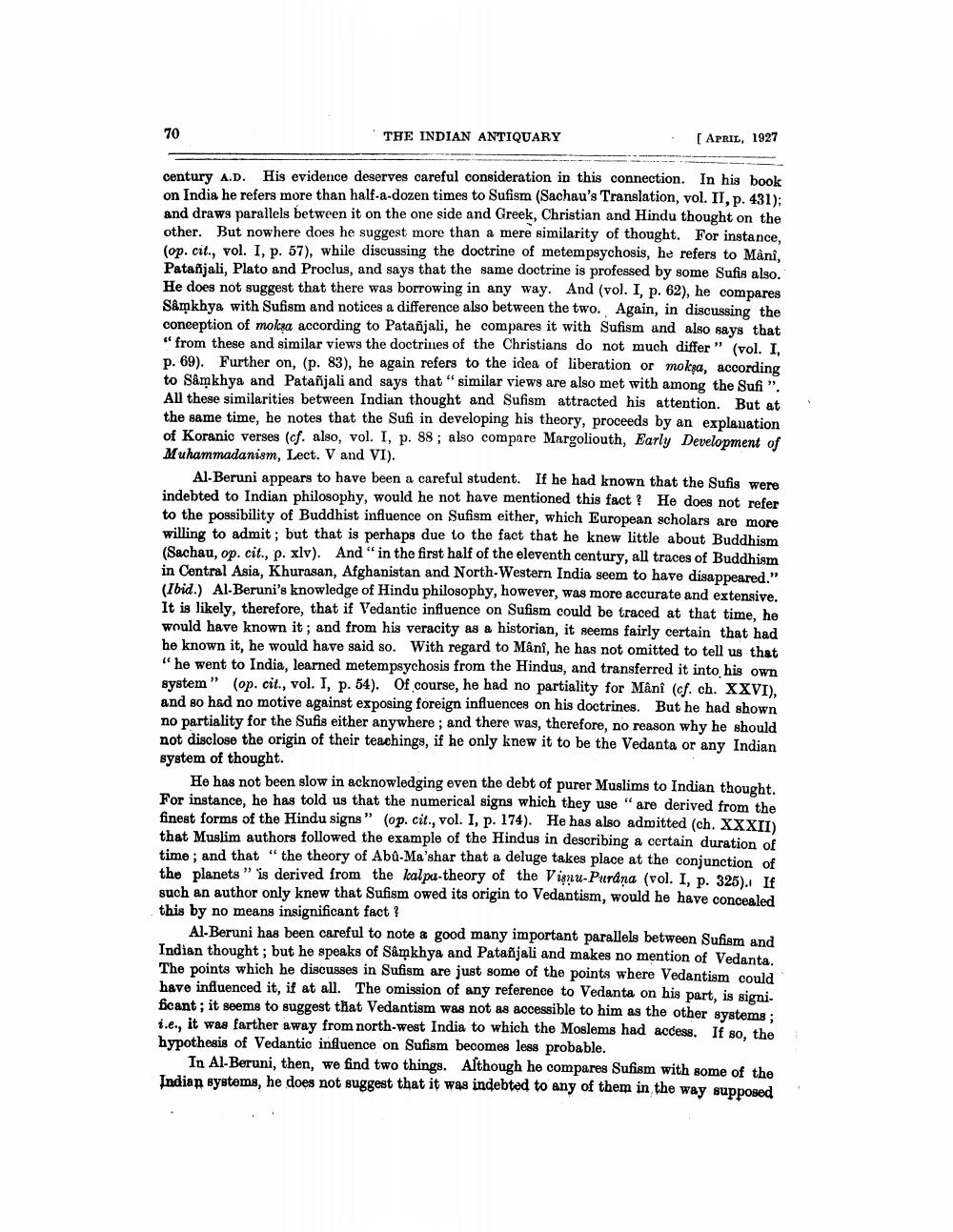________________
70
THE INDIAN ANTIQUARY
[APRIL, 1927
century A.D. His evidence deserves careful consideration in this connection. In his book on India he refers more than half-a-dozen times to Sufism (Sachau's Translation, vol. II, p. 431); and draws parallels between it on the one side and Greek, Christian and Hindu thought on the other. But nowhere does he suggest more than a mere similarity of thought. For instance, (op. cit., vol. I, p. 57), while discussing the doctrine of metem psychosis, he refers to Mânî, Patañjali, Plato and Proclus, and says that the same doctrine is professed by some Sufis also. He does not suggest that there was borrowing in any way. And (vol. I, p. 62), he compares Samkhya with Sufism and notices a difference also between the two. Again, in discussing the conception of mokaa according to Patañjali, he compares it with Sufism and also says that "from these and similar views the doctrines of the Christians do not much differ” (vol. I, p. 69). Further on, (p. 83), he again refers to the idea of liberation or mokra, according to Samkhya and Patañjali and says that "similar views are also met with among the Sufi". All these similarities between Indian thought and Sufism attracted his attention. But at the same time, he notes that the Sufi in developing his theory, proceeds by an explanation of Koranic verses (cf. also, vol. I, p. 88; also compare Margoliouth, Early Development of Muhammadanism, Lect. V and VI).
Al-Beruni appears to have been a careful student. If he had known that the Sufis were indebted to Indian philosophy, would he not have mentioned this fact? He does not refer to the possibility of Buddhist influence on Sufism either, which European scholars are more willing to admit; but that is perhaps due to the fact that he knew little about Buddhism (Sachau, op. cit., p. xlv). And " in the first half of the eleventh century, all traces of Buddhism in Central Asia, Khurasan, Afghanistan and North-Western India seem to have disappeared." (Ibid.) Al-Beruni's knowledge of Hindu philosophy, however, was more accurate and extensive. It is likely, therefore, that if Vedantic influence on Sufism could be traced at that time, he would have known it, and from his veracity as a historian, it seems fairly certain that had he known it, he would have said so. With regard to Mâni, he has not omitted to tell us that "he went to India, learned metempsychosis from the Hindus, and transferred it into his own system" (op. cit., vol. I, p. 54). Of course, he had no partiality for Mâni (cf. ch. XXVI). and so had no motive against exposing foreign influences on his doctrines. But he had shown no partiality for the Sufis either anywhere, and there was, therefore, no reason why he should not disclose the origin of their teachings, if he only knew it to be the Vedanta or any Indian system of thought.
He has not been slow in acknowledging even the debt of purer Muslims to Indian thought. For instance, he has told us that the numerical signs which they use " are derived from the finest forms of the Hindu signs” (op. cit., vol. I, p. 174). He has also admitted (ch. XXXII) that Muslim authors followed the example of the Hindus in describing a certain duration of time, and that "the theory of Abu-Ma'shar that a deluge takes place at the conjunction of the planets" is derived from the lalpu-theory of the Vişnu-Purana (vol. I, p. 325). If such an author only knew that Sufism owed its origin to Vedantism, would he have concealed this by no means insignificant fact?
Al-Beruni has been careful to note a good many important parallels between Sufism and Indian thought; but he speaks of Samkhya and Patañjali and makes no mention of Vedanta. The points which he discusses in Sufism are just some of the points where Vedantism could have influenced it, if at all. The omission of any reference to Vedanta on his part, is significant; it seems to suggest that Vedantism was not as accessible to him as the other systems; i.e., it was farther away from north-west India to which the Moslems had access. If so, the hypothesis of Vedantic influence on Sufism becomes less probable.
In Al-Beruni, then, we find two things. Although he compares Sufism with some of the Indian systems, he does not suggest that it was indebted to any of them in the way supposed




